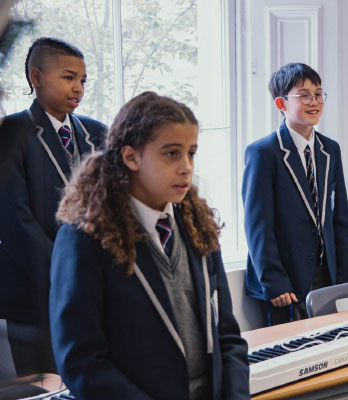
The background
The foundation of the Knowledge Schools Trust (KST) originates from being one of the first Free Schools set up in this country – back in 2012 – by a group of like-minded parents. Ten years on, there are now six schools in the Trust – four in London – a Secondary and three Primary Schools – another Primary in Buckinghamshire, one in Bedfordshire, with recent approval to set up a new Secondary School in Cambridge that they intend to open in 2023/24.
With such a background comes a clear vision rooted in founding and taking on Free Schools and Academies from London to Cambridge (and any in between) for the betterment of all – working with the Schools Commissioner to help turn schools around – as they have done with the two schools they have taken on so far. The Trust has a simple – but unifying – ethos to provide children with a classical liberal education, regardless of background or ability.
Coupled with this are two interesting curriculum-based projects set up as commercial ventures – the Primary Knowledge Curriculum (offering a range of materials for Primary Schools on a knowledge-basis); and a phonics programme known as the Essential Letters and Sounds programme. Both ventures are going well, revealing a lot about the innovative intent of this leadership team.
The technology vision
Like many new schools at that time, KST had installed an array of new technology but without the continued investment – and inclination – to keep it relevant. However, as the Trust grew, and a new entrepreneurial spirit at Trust level was born as they set about forging a new type of school, the need for change was critical.
“We have a classical academic curriculum – where books and pens stand very firmly at the centre of our teaching model. Where technology comes in is in the way that it supports this – in enabling teaching and learning to operate in a more cohesive manner”.
Stewart Keiller, Chief Operations Officer
It was at this stage – around 3 ½ years ago – that they appointed a new Chief Operations Officer to look at the strategic thinking behind IT across the Trust with a remit to make recommendations for investment – in both software and hardware – that would support the growth of the Trust and enable high quality teaching and learning.
Selecting the right support
The third-party providers that KST had in place at that time were not in a position to champion such a review, so the Trust went through a procurement process – reviewing five different providers – before awarding the contract to RM.
“We selected RM because they articulated a clear sense of strategy and could help us sort out our issues – we had a real sense that they understood our problems and could lay down a roadmap to resolve them”.
Stewart Keiller, Chief Operations Officer

Like many schools and Trusts, getting the right partner is at least as important as the amount of money you pay for that support... although the two have to come together.
“When we were tendering price wasn’t our biggest priority. We were prepared to spend money to sort out the problems, but actually RM came in at a very keen price, making it a relatively straightforward decision”.
Stewart Keiller, Chief Operations Officer

Ultimately it is about trust and confidence. Reliable technology is so important to a school, and having a network that is reliable, and a partner that you trust to make the right recommendations will save you significantly in the long run. Whilst the final decisions will always sit with the Trust, being challenged by a partner who is prepared to bring their experience to bear, is crucial.
“What really swung it for us was the Service Manager that RM brought into the bid process. He was very good, and by allowing us to eyeball the person we would be working with long-term – during the tender – was very smart. That really helped RM win the contract”.
Stewart Keiller, Chief Operations Officer
The technology journey
With a partner in place that they could rely upon, Knowledge Schools Trust set about modernising what they had in place. They invested in 60 new laptops for the teachers at their Secondary School to enable every teacher to take into class a device that they could simply plug in and start teaching immediately. Until this point, the laptops they had were old and failing – they took too long to switch on, they didn’t do what the teachers needed them to do, and collectively were not giving the teaching staff the confidence they needed.
“Moving to the cloud was the next key decision. We switched to a cloud-based MIS provider, we enhanced our broadband connectivity to 1GB into each school, and brought all our Microsoft tenancies into one, providing single sign-on and much greater control. More recently we have moved all our files onto a single SharePoint – with a browser that includes all the most used links”.
Stewart Keiller, Chief Operations Officer

The school also committed to a full technology refresh every five years – ensuring what they had remained effective. They also rolled out laptops to all Primary School teachers so they could prepare lessons outside of class, helping them better manage their time.
“Of course lockdown was a huge catalyst. Almost overnight we had to learn to remote teach. We implemented MS Teams in about three weeks, which is quite an achievement. Our Primary teachers pre-recorded lessons in a very innovative way – uploading them to the website for pupils to download and use at home”.
Stewart Keiller, Chief Operations Officer

That said, it has not all been plain sailing. It has taken time, money and with more than the occasional set-back. For example, in the midst of this, the Trust were hit with a major ransomware attack that locked down all of their servers, and it was evident that all parties – including RM – had taken their eye off the ball.
“The ransomware attack was an important moment in our journey. It reinforced the risks that exist every day, as well as the importance of being prepared – for example in having back-ups in place. It also reinforced the value of having a good working relationship with your IT partner – despite some fraught discussions, we worked through this together and came through it stronger than ever”.
Stewart Keiller, Chief Operations Officer
Critically in any service industry, the key often comes down to the people doing the work. In the case of a Trust like KST they needed people who are not only competent, but who are proactive and make things happen. That is true irrespective of whether it is someone senior such as an Account Director, or someone earlier in their career such as a site engineer.
“I see the RM team as an extension of my team – I do not see them as a separate function – I treat them all equally. We figure things out together”.
Stewart Keiller, Chief Operations Officer

Importantly, this is a journey. For KST, they had to start by restoring what was a broken infrastructure before they could build something robust and reliable for the future. This included migrating (almost) everything to the cloud, investing in modern and reliable devices, software that really did enhance teaching and learning, and then – and only then – looking to embed technology into the culture of the school.
“Another great thing about RM is they have developed an annual roadmap for us, which is effectively setting out our strategy – we now know what needs replacing, when, and we get to benefit from their wider experience in the sector”.
Stewart Keiller, Chief Operations Officer
Like so many things in life, you only get interested in something when it goes wrong, so the acid test is often in how many complaints you receive. For many teachers they just want technology that works – they switch it on, it does what it is meant to do, and their life is better.
“If I look at my in-box of IT issues now compared to 3 ½ years ago, I probably get 80-90% less issues escalated to me than I did then. Success is IT that just works”.
Stewart Keiller, Chief Operations Officer

Sharing best practice
- Ensure that your Senior Management Team are on board with spending money – especially in a climate when budgets will be tougher than ever over the next few years, making cash for technology harder than ever to find. You need to convince people up front that it is worth spending the money.
- Keep to one software family – – do not try to mix and match. Make the decision early and stick to Microsoft or Google – do not try to offer both. Mac or Windows – providing a choice is more than twice as costly. Zoom or Teams – they do similar things – keep it simple.
- Have thick skin to weather the storm – digital transformation is painful. It involves a lot of communication to staff, heads, and governors. If they understand what is going on, they will be a lot more forgiving. Keep them informed every step of the way.
- Have a partner to rely upon – someone who understands the education sector takes some of the pressure off. You depend on that expertise, but you still hold them to account – there needs to be a little bit of tension – but at the end of the day, you have to have a common purpose and shared goals.
The future
No matter where you are starting from today, technology will play a role in your future. In many respects the sooner you start that journey – the sooner you will get to reap the rewards. For KST, their journey is well underway.
Whilst there is much still to do, the Trust feels in a stronger place today than it was just 3 ½ years ago. They have technology that just works, they have staff who have confidence in the use of that technology, and a willingness to try new things. Perhaps more than anything, they have a long-term commitment to keep moving on that journey. Whether you are a teacher at KST, a pupil, or a parent, it is clear that this Trust is committed to an exciting future.
“We cannot predict the future, but we can certainly put ourselves in the best possible place to influence it. At KST, we are on our digital journey and I am excited about the ways that we will use that technology for the benefit of all”.
Stewart Keiller, Chief Operations Office
Download a PDF of the case study